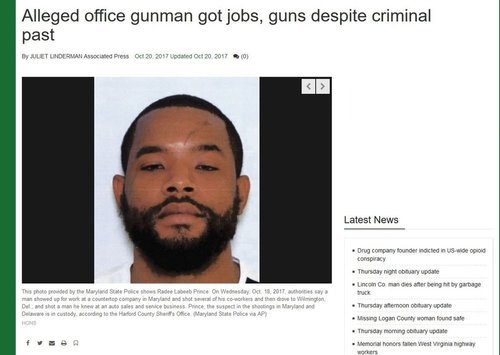
Disgruntled Minority Massacre: Black Gunman Shoots Five Non-Black Fellow Employees, Killing Three
10/26/2017
A few days ago, a black gunman named Radee Ladeeb Prince, pictured above, went on a shooting rampage, killing three fellow employees of the granite company where he was working, killing Bayarsaikhan Tudev, 53, Jose Hidalgo Romero, 34, and Enis Mrvoljak, 48, and wounding Enoc Sosa, 38 and Jose Roberto Flores, 37.
I refer to the victims as non-black rather than white — three are Hispanic and Mr. Tudev was actually a Mongolian Christian — but I suspect that to a disgruntled black gunman, this is a distinction without a difference as far as hate is concerned. John Derbyshire has been saying for years that "it helps to start with a simplistic view of race, a view that regards Americans as belonging to two races only: black, and nonblack. " This is the view blacks themselves take, as George Zimmerman could tell you.
The shooter action fit a a pattern I've called a "Disgruntled Minority Massacre" in which a a black or Hispanic employee shoots up his workplace out of racial resentment.
Another granite company where he had worked tried to get a restraining order against him, which was refused, in spite of the fact that head been coming back to their workplace to berate them and at least once punched one of them. The people at the granite company that he did shoot up were also afraid of him. The story Alleged office gunman got jobs, guns despite criminal past [By Juliet Linderman, Associated Press, October 20, 2017] explains how lengthy his criminal record was, and asks why he had either a job or a gun.
The man charged with shooting five co-workers at a Maryland granite company this week, killing three of them, is a felon with dozens of arrests and a history of attacking people he worked with. With such a troubled past, how was Radee Prince able to land a decent-paying job and acquire a gun?It appears he may have slipped through the cracks of the criminal justice system, and presumably the companies that hired him either didn’t do a thorough background check or decided to give him a chance despite his past. Since the shooting, at least two local officials have questioned whether he should have been out on the street.
WHAT HAS PRINCE BEEN ARRESTED FOR?
Prince had more than 42 arrests in Delaware, and several more in Maryland and Washington. In 2003, he pleaded guilty to 15 counts of burglary in Delaware, and was sentenced to 25 years. However, 23 years were suspended, and he served only two years behind bars.
In March 2015, Prince was pulled over in Cecil County, Maryland, for a broken headlight. He was aggressive and screamed at an officer, who found a pistol in Prince’s car, according to court documents. He was charged with gun violations, but those charges were dropped.
Interim State’s Attorney Steven Trostle said in a statement that prosecutors concluded "that there would be insufficient evidence to convict Mr. Prince." He didn’t offer any additional comment.
The nationwide ban on felons owning guns goes back to the Gun Control Act of 1968 when I personally was ten years old. The nationwide federal controls on individual gun buyers — the Brady Bill, with it’s National Instant Criminal Background Check System dates from 1993, before many of readers were born, and when Mr. Prince was 13.
This is not a failure of gun control laws, it’s a failure of law enforcement. (The failure to charge him with gun charges may be because they thought a court would suppress the evidence on Fourth Amendment grounds — possibly because he would automatically claim profiling.)
When you're reading about the great moral crusades of today like
- Ending mass incarceration by letting blacks get away with crime with no prison terms
- Preventing police from doing traffic stops of blacks
- The "ban the box" crusade to force employers to hire black felons
